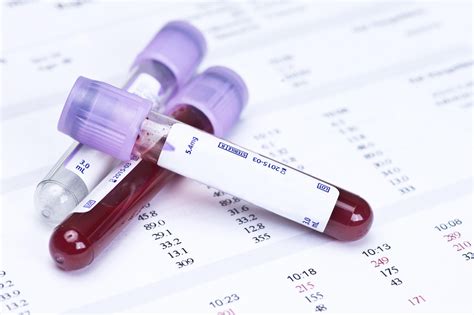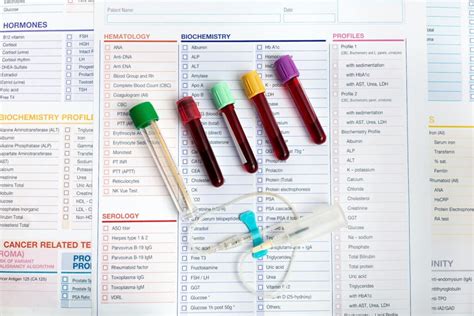Intro
Learn to decipher blood test results with 5 easy ways, understanding key health indicators, lab values, and medical terminology to interpret complete blood count, blood chemistry, and other diagnostic tests accurately.
Understanding blood test results can be a daunting task, especially for those without a medical background. However, being able to interpret these results is crucial for managing one's health effectively. Blood tests are a common diagnostic tool used by healthcare professionals to assess various aspects of a patient's health, ranging from the presence of infections to the functioning of vital organs like the liver and kidneys. The ability to read and understand blood results empowers individuals to take a more active role in their healthcare, facilitating better communication with healthcare providers and more informed decision-making.
The process of reading blood results begins with understanding the different components of a blood test. A complete blood count (CBC), for instance, measures several components of the blood, including red blood cell count, white blood cell count, hemoglobin, hematocrit, and platelet count. Each of these components provides valuable information about the body's condition. For example, a low red blood cell count could indicate anemia, while an elevated white blood cell count might suggest the presence of an infection.
The importance of understanding blood results cannot be overstated. It not only helps in the early detection of diseases but also in monitoring the effectiveness of treatments. Patients who are proactive about their health, including understanding their blood results, often experience better health outcomes. This proactive approach encourages a collaborative relationship between patients and healthcare providers, leading to more personalized and effective care plans.
Understanding the Basics of Blood Tests

To read blood results, one must first understand the basics of blood tests. This includes knowing what each test measures and what the normal ranges are for each component. Normal ranges can vary slightly between different laboratories, so it's essential to refer to the specific ranges provided by the testing laboratory. Blood tests can be categorized into several types, including complete blood counts, blood chemistry tests, and blood enzyme tests, each providing unique insights into the body's health.
Components of a Complete Blood Count (CBC)
A CBC is one of the most common blood tests and includes several key measurements: - Red Blood Cell (RBC) count: Measures the number of red blood cells in the blood, which carry oxygen throughout the body. - White Blood Cell (WBC) count: Measures the number of white blood cells, which are part of the immune system. - Hemoglobin (Hb): Measures the amount of hemoglobin in the blood, which is the protein in red blood cells that carries oxygen. - Hematocrit (Hct): Measures the proportion of red blood cells in the blood. - Platelet count: Measures the number of platelets, which are involved in blood clotting.Interpreting Blood Test Results

Interpreting blood test results involves comparing the measured values of the various blood components against the normal ranges. Values that fall outside these ranges can indicate a health issue. For instance, a high WBC count could indicate an infection, while a low RBC count might suggest anemia. It's crucial to understand that some variations in blood test results can be due to factors other than illness, such as dehydration or certain medications.
Common Abnormalities and Their Implications
- **Anemia**: Indicated by low hemoglobin or hematocrit levels, anemia can lead to symptoms like fatigue, weakness, and shortness of breath. - **Infection**: Elevated WBC counts can signal the presence of an infection. The type of white blood cell that is elevated can provide clues about the type of infection. - **Bleeding Disorders**: Abnormal platelet counts or function can indicate a bleeding disorder, which may require specific management to prevent excessive bleeding.5 Ways to Improve Your Understanding of Blood Results

- Consult Your Healthcare Provider: The best way to understand your blood results is by discussing them with your healthcare provider. They can explain what the results mean in the context of your overall health and any symptoms you may be experiencing.
- Keep a Record: Keeping a record of your blood test results over time can help you track changes and identify patterns. This can be particularly useful for managing chronic conditions.
- Learn About Normal Ranges: Understanding what constitutes a normal range for each blood component can help you better interpret your results. However, always refer to the ranges provided by the laboratory that conducted your test.
- Stay Informed: Continuously educating yourself about health and medicine can enhance your ability to understand and interpret blood results. Reliable health websites, medical journals, and health education programs are valuable resources.
- Ask Questions: Don't hesitate to ask your healthcare provider questions about your blood results. Understanding your health is your right, and being informed empowers you to make better health decisions.
The Role of Technology in Understanding Blood Results

Technology has significantly simplified the process of understanding blood results. Many healthcare providers now offer online portals where patients can access their test results directly. Additionally, there are numerous health applications and websites that provide detailed explanations of blood tests and help individuals track their health metrics over time. These tools can facilitate a more engaged and informed approach to healthcare, enabling individuals to monitor their health more effectively and make lifestyle changes based on their blood test results.
Benefits of Digital Health Records
- **Accessibility**: Digital records make it easier for patients to access their health information, including blood test results, from anywhere. - **Accuracy**: Electronic systems can reduce errors in recording and interpreting test results. - **Efficiency**: Digital records facilitate quicker communication between healthcare providers and patients, leading to more timely interventions.Conclusion and Future Directions

In conclusion, understanding blood results is a critical aspect of managing one's health. By being proactive and informed, individuals can take a more active role in their healthcare, leading to better health outcomes. The future of healthcare is moving towards more personalized and patient-centered care, with technology playing a pivotal role in this transition. As healthcare continues to evolve, the ability to interpret and understand blood results will become even more essential for individuals seeking to navigate the healthcare system effectively.
Empowering Patients Through Education
Empowering patients with the knowledge to understand their blood results is a key step in improving health outcomes. This empowerment not only fosters a more collaborative patient-provider relationship but also encourages individuals to adopt healthier lifestyles and manage chronic conditions more effectively. As the healthcare landscape continues to evolve, the importance of patient education and engagement will only continue to grow.What is a complete blood count (CBC), and what does it measure?
+A complete blood count (CBC) is a blood test that measures several components of the blood, including red blood cell count, white blood cell count, hemoglobin, hematocrit, and platelet count. It provides valuable information about the body's condition, including signs of infection, anemia, or bleeding disorders.
How can I get a copy of my blood test results?
+You can obtain a copy of your blood test results by contacting your healthcare provider or by accessing them through your online patient portal, if available. It's essential to review your results with your healthcare provider to understand what they mean and how they relate to your health.
What if my blood test results are abnormal? What are the next steps?
+If your blood test results are abnormal, your healthcare provider will discuss the findings with you and recommend the next steps. This might include additional testing, lifestyle changes, or treatment. It's crucial to follow up with your healthcare provider to address any concerns and to monitor your condition over time.
Can I interpret my blood test results on my own, or do I need a healthcare professional?
+While you can learn about what different blood tests measure and their normal ranges, interpreting your results in the context of your health requires the expertise of a healthcare professional. They can provide a comprehensive understanding of your results, considering your medical history, symptoms, and other relevant factors.
How often should I have blood tests to monitor my health?
+The frequency of blood tests depends on your health status, age, and any underlying conditions you may have. Your healthcare provider will recommend a schedule for blood tests based on your individual needs. For example, individuals with chronic conditions like diabetes may need more frequent monitoring, while healthy adults might only require periodic check-ups.
We invite you to share your thoughts and experiences with understanding blood results. Your insights can help others navigate the complexities of healthcare and encourage a more proactive approach to health management. Consider commenting below or sharing this article with someone who might benefit from this information. Together, we can foster a community that values informed and engaged healthcare practices.
